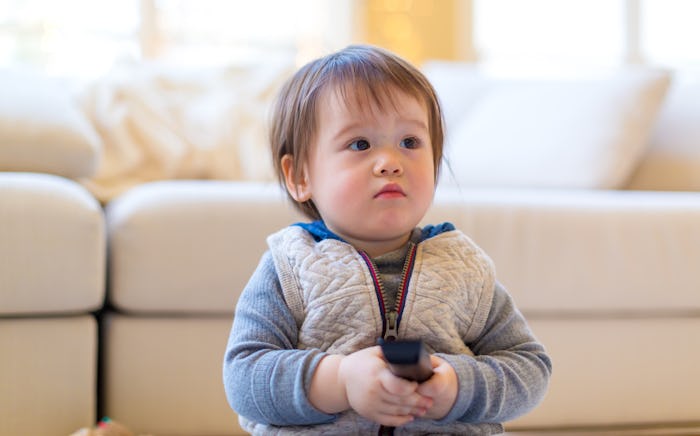Life

Here's What To Look For If You Think Your Toddler Needs Glasses
Both my husband and I wear glasses. And while some people think it’s irritatingly cute to see us together with matching specs, it kind of makes us worry about our son who is about to come into this world. I mainly need mine for reading and driving, but my husband is pretty close to being blind without his glasses. What does this mean for our son? Should we be looking for signs when he’s an infant? And what are some signs your toddler needs glasses for us to keep in mind for the future?
According to the Johns Hopkins Medicine website, signs your toddler needs glasses include them squinting, tilting their head to one side, rubbing their eyes frequently, and complaining of headaches. So, you know, the same way adults realize they need glasses. Dr. S. Daniel Ganjian, a pediatrician at Providence Saint John’s Health Center in Santa Monica, California adds, “If your child has to sit close to the screen to appreciate its display, has frequent headaches, or eye tearing, then talk to your pediatrician.”
Can you tell if your kid will have future eye problems when they’re just a baby so you can plan ahead? The American Optometric Association (AOA) noted that between birth and 4 months, your child should be able to show that their eyes are able to work together and their "vision is rapidly improving. Eye-hand coordination begins to develop as the infant starts tracking moving objects with his or her eyes and reaching for them. By 8 weeks, babies begin to more easily focus their eyes on the faces of a parent or other person near them." So if they're doing all of these things, you probably don't have a problem. However, all babies develop differently. If you're concerned call your pediatrician. It couldn't hurt.
Ganjian tells Romper that poor vision can even start as early as birth. “If you see a speck of cloudiness in your child's lenses, when you take a picture the eyes look different between the right and left eye, or eyes are constantly crossed, or are intermittently crossed even after 2 months old, let your pediatrician examine your child.”
So what causes bad eyesight in the first place? Is it hereditary? Ganjian says sometimes it can be hereditary, and that’s why it’s important to give your pediatrician a full and in-depth family history.
Ganjian says another reason for poor eyesight in toddlers could be due to time spend in front of a “blue light,” like iPads and tablets. “Blue light is higher in energy and can damage the eye after prolonged use. While screens have lower blue light levels than the sun, nevertheless, the prolonged used of screens can have a damaging effect from its cumulative effects. Toddlers should not watch a screen for more than 20 minutes a day (the less the better) to prevent problems with vision, attention, behavior, and sleep,” Ganjian warns. One suggestion to preventing your toddler from being on the iPad too much is to keep all bedrooms and meal time media-free, he suggests. (Easier said than done, right?)
Sometimes poor eyesight is just hereditary and there’s not much you can do to prevent it. In toddlers, just look for signs of squinting, frequent headaches, excessive tripping and falling, and if they’re holding things closer than normal to view them. However, you can look for signs as early as infancy in your child, especially if they were premature or poor eyesight runs in the family. No matter what, talk to your pediatrician if you're worried about your little one's eyesight. They can offer you more advice and input.
Check out Romper's new video series, Bearing The Motherload, where disagreeing parents from different sides of an issue sit down with a mediator and talk about how to support (and not judge) each other’s parenting perspectives. New episodes air Mondays on Facebook.